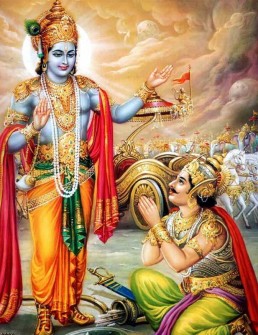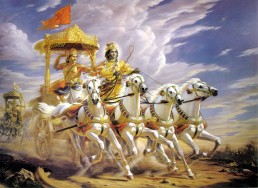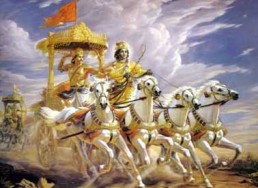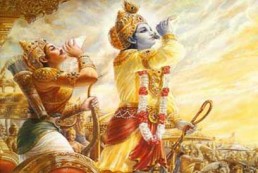Bhagavad Gita-Chapter 1 All Verses with Meaning and Audio
धर्मक्षेत्रे कुरुक्षेत्रे समवेता युयुत्सवः ।
मामकाः पाण्डवाश्चैव किमकुर्वत सञ्जय ॥ १-१॥
dharmakṣetre kurukṣetre samavetā yuyutsavaḥ
māmakāḥ pāṇḍavāścaiva kimakurvata sañjaya 1-1
दृष्ट्वा तु पाण्डवानीकं व्यूढं दुर्योधनस्तदा ।
आचार्यमुपसङ्गम्य राजा वचनमब्रवीत् ॥ १-२॥
dṛṣṭvā tu pāṇḍavānīkaṃ vyūḍhaṃ duryodhanastadā .
ācāryamupasaṅgamya rājā vacanamabravīt 1-2
व्यूढां द्रुपदपुत्रेण तव शिष्येण धीमता ॥ १-३॥
vyūḍhāṃ drupadaputreṇa tava śiṣyeṇa dhīmatā 1-3
युयुधानो विराटश्च द्रुपदश्च महारथः ॥ १-४॥
yuyudhāno virāṭaśca drupadaśca mahārathaḥ 1-4
पुरुजित्कुन्तिभोजश्च शैब्यश्च नरपुङ्गवः ॥ १-५॥
purujitkuntibhojaśca śaibyaśca narapuṅgavaḥ 1-5
सौभद्रो द्रौपदेयाश्च सर्व एव महारथाः ॥ १-६॥
saubhadro draupadeyāśca sarva eva mahārathāḥ 1-6
नायका मम सैन्यस्य संज्ञार्थं तान्ब्रवीमि ते ॥ १-७॥
nāyakā mama sainyasya saṃjñārthaṃ tānbravīmi te 1-7
अश्वत्थामा विकर्णश्च सौमदत्तिस्तथैव च ॥ १-८॥
aśvatthāmā vikarṇaśca saumadattistathaiva ca 1-8
नानाशस्त्रप्रहरणाः सर्वे युद्धविशारदाः ॥ १-९॥
nānāśastrapraharaṇāḥ sarve yuddhaviśāradāḥ 1-9
पर्याप्तं त्विदमेतेषां बलं भीमाभिरक्षितम् ॥ १-१०॥
paryāptaṃ tvidameteṣāṃ balaṃ bhīmābhirakṣitam 1-10
भीष्ममेवाभिरक्षन्तु भवन्तः सर्व एव हि ॥ १-११॥
bhīṣmamevābhirakṣantu bhavantaḥ sarva eva hi 1-11
सिंहनादं विनद्योच्चैः शङ्खं दध्मौ प्रतापवान् ॥ १-१२॥
siṃhanādaṃ vinadyoccaiḥ śaṅkhaṃ dadhmau pratāpavān 1-12
सहसैवाभ्यहन्यन्त स शब्दस्तुमुलोऽभवत् ॥ १-१३॥
sahasaivābhyahanyanta sa śabdastumulo’bhavat 1-13
माधवः पाण्डवश्चैव दिव्यौ शङ्खौ प्रदध्मतुः ॥ १-१४॥
mādhavaḥ pāṇḍavaścaiva divyau śaṅkhau pradadhmatuḥ 1-14
पौण्ड्रं दध्मौ महाशङ्खं भीमकर्मा वृकोदरः ॥ १-१५॥
pauṇḍraṃ dadhmau mahāśaṅkhaṃ bhīmakarmā vṛkodaraḥ 1-15
नकुलः सहदेवश्च सुघोषमणिपुष्पकौ ॥ १-१६॥
nakulaḥ sahadevaśca sughoṣamaṇipuṣpakau 1-16
धृष्टद्युम्नो विराटश्च सात्यकिश्चापराजितः ॥ १-१७॥
dhṛṣṭadyumno virāṭaśca sātyakiścāparājitaḥ 1-17
सौभद्रश्च महाबाहुः शङ्खान्दध्मुः पृथक्पृथक् ॥ १-१८॥
saubhadraśca mahābāhuḥ śaṅkhāndadhmuḥ pṛthakpṛthak 1-18
नभश्च पृथिवीं चैव तुमुलोऽभ्यनुनादयन् ॥ १-१९॥
nabhaśca pṛthivīṃ caiva tumulo’bhyanunādayan 1-19
प्रवृत्ते शस्त्रसम्पाते धनुरुद्यम्य पाण्डवः ।
हृषीकेशं तदा वाक्यमिदमाह महीपते ॥ १-२०॥
pravṛtte śastrasampāte dhanurudyamya pāṇḍavaḥ
hṛṣīkeśaṃ tadā vākyamidamāha mahīpate1-20
सेनयोरुभयोर्मध्ये रथं स्थापय मेऽच्युत ॥ १-२१॥
senayorubhayormadhye rathaṃ sthāpaya me’cyuta 1-21
कैर्मया सह योद्धव्यमस्मिन् रणसमुद्यमे ॥ १-२२॥
kairmayā saha yoddhavyamasmin raṇasamudyame 1-22
धार्तराष्ट्रस्य दुर्बुद्धेर्युद्धे प्रियचिकीर्षवः ॥ १-२३॥
dhārtarāṣṭrasya durbuddheryuddhe priyacikīrṣavaḥ 1-23
एवमुक्तो हृषीकेशो गुडाकेशेन भारत ।
सेनयोरुभयोर्मध्ये स्थापयित्वा रथोत्तमम् ॥ १-२४॥
evamukto hṛṣīkeśo guḍākeśena bhārata
senayorubhayormadhye sthāpayitvā rathottamam 1-24
उवाच पार्थ पश्यैतान् समवेतान्कुरूनिति॥ १-२५॥
uvāca pārtha paśyaitān samavetānkurūniti 1-25
आचार्यान्मातुलान्भ्रातॄन् पुत्रान्पौत्रान्सखींस्तथा ॥ १-२६॥
ācāryānmātulānbhrātṝn putrānpautrānsakhīṃstathā 1-26
तान्समीक्ष्य स कौन्तेयः सर्वान्बन्धूनवस्थितान् ।
कृपया परयाविष्टो विषीदन्निदमब्रवीत् ॥ १-२७॥
tānsamīkṣya sa kaunteyaḥ sarvānbandhūnavasthitān
kṛpayā parayāviṣṭo viṣīdannidamabravīt 1-27
दृष्ट्वेमं स्वजनं कृष्ण युयुत्सुं समुपस्थितम् ॥ १-२८॥
dṛṣṭvemaṃ svajanaṃ kṛṣṇa yuyutsuṃ samupasthitam 1-28
वेपथुश्च शरीरे मे रोमहर्षश्च जायते ॥ १-२९॥
vepathuśca śarīre me romaharṣaśca jāyate 1-29
न च शक्नोम्यवस्थातुं भ्रमतीव च मे मनः ॥ १-३०॥
na ca śaknomyavasthātuṃ bhramatīva ca me manaḥ 1-30
न च श्रेयोऽनुपश्यामि हत्वा स्वजनमाहवे ॥ १-३१॥
na ca śreyo’nupaśyāmi hatvā svajanamāhave 1-31
किं नो राज्येन गोविन्द किं भोगैर्जीवितेन वा ॥ १-३२॥
kiṃ no rājyena govinda kiṃ bhogairjīvitena vā 1-32
त इमेऽवस्थिता युद्धे प्राणांस्त्यक्त्वा धनानि च ॥ १-३३॥
ta ime’vasthitā yuddhe prāṇāṃstyaktvā dhanāni ca 1-33
मातुलाः श्वशुराः पौत्राः श्यालाः सम्बन्धिनस्तथा ॥ १-३४॥
mātulāḥ śvaśurāḥ pautrāḥ śyālāḥ sambandhinastathā 1-34
अपि त्रैलोक्यराज्यस्य हेतोः किं नु महीकृते ॥ १-३५॥
api trailokyarājyasya hetoḥ kiṃ nu mahīkṛte 1-35
पापमेवाश्रयेदस्मान् हत्वैतानाततायिनः ॥ १-३६॥
pāpamevāśrayedasmān hatvaitānātatāyinaḥ 1-36
स्वजनं हि कथं हत्वा सुखिनः स्याम माधव ॥ १-३७॥
svajanaṃ hi kathaṃ hatvā sukhinaḥ syāma mādhava 1-37
कुलक्षयकृतं दोषं मित्रद्रोहे च पातकम् ॥ १-३८॥
kulakṣayakṛtaṃ doṣaṃ mitradrohe ca pātakam 1-38
कुलक्षयकृतं दोषं प्रपश्यद्भिर्जनार्दन ॥ १-३९॥
kulakṣayakṛtaṃ doṣaṃ prapaśyadbhirjanārdana 1-39
धर्मे नष्टे कुलं कृत्स्नमधर्मोऽभिभवत्युत ॥ १-४०॥
dharme naṣṭe kulaṃ kṛtsnamadharmo’bhibhavatyuta 1-40
स्त्रीषु दुष्टासु वार्ष्णेय जायते वर्णसङ्करः ॥ १-४१॥
strīṣu duṣṭāsu vārṣṇeya jāyate varṇasaṅkaraḥ 1-41
पतन्ति पितरो ह्येषां लुप्तपिण्डोदकक्रियाः ॥ १-४२॥
patanti pitaro hyeṣāṃ luptapiṇḍodakakriyāḥ 1-42
उत्साद्यन्ते जातिधर्माः कुलधर्माश्च शाश्वताः ॥ १-४३॥
utsādyante jātidharmāḥ kuladharmāśca śāśvatāḥ 1-43
नरके नियतं वासो भवतीत्यनुशुश्रुम ॥ १-४४॥
narake niyataṃ vāso bhavatītyanuśuśruma 1-44
यद्राज्यसुखलोभेन हन्तुं स्वजनमुद्यताः ॥ १-४५॥
yadrājyasukhalobhena hantuṃ svajanamudyatāḥ 1-45
धार्तराष्ट्रा रणे हन्युस्तन्मे क्षेमतरं भवेत् ॥ १-४६॥
dhārtarāṣṭrā raṇe hanyustanme kṣemataraṃ bhavet 1-46
सञ्जय उवाच ।
एवमुक्त्वार्जुनः सङ्ख्ये रथोपस्थ उपाविशत् ।
विसृज्य सशरं चापं शोकसंविग्नमानसः ॥ १-४७॥
ॐ तत्सदिति श्रीमद्भगवद्गीतासूपनिषत्सु
ब्रह्मविद्यायां योगशास्त्रे श्रीकृष्णार्जुनसंवादे
अर्जुनविषादयोगो नाम प्रथमोऽध्यायः ॥ १॥
sañjaya uvāca
evamuktvārjunaḥ saṅkhye rathopastha upāviśat
visṛjya saśaraṃ cāpaṃ śokasaṃvignamānasaḥ 1-47
oṃ tatsaditi śrīmadbhagavadgītāsūpaniṣatsu
brahmavidyāyāṃ yogaśāstre śrīkṛṣṇārjunasaṃvāde
arjunaviṣādayogo nāma prathamo’dhyāyaḥ 1

Description
Bhagavad Gita Chapter 1 Summary
Arjuna Vishada Yoga – Yoga of despondency of Arjuna
Arjuna the great warrior is overpowered by grief and delusion born out of a sense of attachment to his kith and kin. In his delusory state, he makes several fallacious arguments to support his decision not to fight. This sets the stage for the Lord’s teaching which comprises the rest of the Gita.Below are the main themes of Chapter 1:
Verses 1 – 20
Description of the armies and the preparations for the battle.
Verses 21 – 25
Arjuna’s chariot driven to the middle of the battlefield amidst the two armies.
Verses 26 – 28
Arjuna’s change of mind, leading to attachment (rāga)
Verses 25 – 34
Arjuna’s grief on seeing the enormity of the task he is about to undertake (śoka)
Verses 35 – 47
Arjuna’s delusion which stems from his ignorance about the true nature of oneself (moha)
Gita Chapter 1 – Commentary by Swami Paramarthananda
Background
The epic battle of Mahābhārata, fought between the Pāṇḍavas and Kauravas is the scenario in which the Gītā-teaching is imparted. Arjuna, the Pāṇḍava, discovers the problem of saṃsāra in the battlefield. He surrenders to Lord Krishna seeking a solution. Then follows the great teaching.
In order to attain the wisdom that permeates the Gītā one should go through the following phases in life:
1. One should discover the problem of saṃsāra, for which Gītā happens to be a solution. Unless one discovers the disease, one will not seek medicine.
2. One should become possessed by a sincere longing (tīvramumukṣā) for freedom from saṃsāra. This alone can lead to committed and fruitful pursuit.
3. One should realize that one cannot solve this problem independently. The maximum that one can do, as a limited human being, is a rearrangement or a reshaping of the problem.
4. One should surrender to a Guru seeking his guidance. When surrender to the Guru happens, the ground is prepared for the Gītā-teaching to take place.
The entire first chapter and the first part of the second chapter are devoted to show these developments.
The problem of saṃsāra
As shown in the first chapter, the problem of saṃsāra can be said to be the problem of attachment (kṛpā or rāga), grief (śoka or viṣāda) and delusion (moha). When one is not happy with oneself, one has to seek external aids. This leads to dependence and attachment. Since the conditions of the depended factors are unpredictable, the very peace of mind of that person is in trouble. A disturbed mind can make only faulty judgments complicating matters further. Thus a vicious cycle is created. This, in short, is the problem of saṃsāra.
Verse details
Coming to the text, we find, in the first twenty verses, a vivid description of the armies arrayed for battle. After a brief instruction of Duryodhana to his commanders, Bhīṣma, Lord Krishna, Arjuna, and others blow their conches, signaling the commencement of the battle (1 to 20).
At this fateful moment, Arjuna commands Lord Krishna, his charioteer, to place the chariot in the middle of the army to scrutinize the enemy forces. The mischievous Lord brings the chariot in front of Bhīṣma and Droṇa and asks Arjuna to survey the army (21 to 25).
(Till now Arjuna was convinced that his cousins are unrighteous and he, as a kṣatriya, has to fight the battle to establish righteousness.)
In a moment of weakness, Arjuna slips from reason to relation. Instead of seeing the violators of dharma, he sees his beloved kith and kin. Naturally, Arjuna is overpowered by attachment. Then follow the twin offshoots of attachment viz. grief and delusion (26 to 30).
In the next five verses, we see Arjuna expressing his intense grief which shakes him completely. This indicates the extent of his attachment.
Veiled by attachment, his discriminating power becomes inoperative and he commits a series of false judgments. Interestingly enough, Arjuna even quotes the scriptures to support his unreasonable stand. Thus, Arjuna gets caught up in delusion which is depicted from the 36th verse up to the end of the chapter (36 to 47).
In this way, Arjuna finds himself in the deep sea of attachment, sorrow and delusion (rāga, śoka, moha). Arjuna sincerely wants to get out of this problem. He thinks that solution is to drop the battle. But, one corner of his mind is not convinced by this. At the same time, he has not realized that the problem is too deep for him to solve independently. Hence he doesn’t surrender to Krishna either. Thus caught up in a dilemma, Arjuna sits back on the chariot sorrowfully.
Gita 1st Chapter – Main Points
Description of the armies and the preparations: 1 to 20
Arjuna’s chariot driven to the middle of the armies: 21 to 25
Arjuna’s change of mind leading to attachment (rāga): 26 to 28
Arjuna’s grief (śoka): 25 to 34
Arjuna’s delusion (moha): 35 to 47
Since Arjuna’s grief is the main topic, this chapter is aptly called Arjunaviṣādayoga.
Other Bhagavad Gita Shlokams
Bhagavad Gita
The Bhagavad Gita, or the Song of the Lord, is a dialogue between Krishna, an incarnation of Vishnu, and his friend and disciple, Arjuna. Composed of 701 Shlokas arranged in 18 chapters, the Gita is one of the best-known philosophical texts of…
Bhagavad Gita-Chapter 02 All Verses with Meaning and Audio
Bhagavad Gita Chapter 2 All Verses for easy chanting along with Audio and Meaning. Lyrics In English, Sanskrit, Hindi, Telugu, Tamil, Gujarati, Bengali and many more languages.
Bhagavad Gita-Chapter 03 All Verses with Meaning and Audio
Bhagavad Gita Chapter 3 All Verses for easy chanting along with Audio and Meaning. Lyrics In English, Sanskrit, Hindi, Telugu, Tamil, Gujarati, Bengali and many more languages.
Bhagavad Gita-Chapter 04 All Verses with Meaning and Audio
Bhagavad Gita Chapter 4 All Verses for easy chanting along with Audio and Meaning. Lyrics In English, Sanskrit, Hindi, Telugu, Tamil, Gujarati, Bengali and many more languages.
Bhagavad Gita-Chapter 05 All Verses with Meaning and Audio
Bhagavad Gita Chapter 5 All Verses for easy chanting along with Audio and Meaning. Lyrics In English, Sanskrit, Hindi, Telugu, Tamil, Gujarati, Bengali and many more languages.
Bhagavad Gita-Chapter 06 All Verses with Meaning and Audio
Bhagavad Gita Chapter 6 All Verses for easy chanting along with Audio and Meaning. Lyrics In English, Sanskrit, Hindi, Telugu, Tamil, Gujarati, Bengali and many more languages.
Bhagavad Gita-Chapter 07 All Verses with Meaning and Audio
Bhagavad Gita Chapter 7 All Verses for easy chanting along with Audio and Meaning. Lyrics In English, Sanskrit, Hindi, Telugu, Tamil, Gujarati, Bengali and many more languages.
Bhagavad Gita-Chapter 08 All Verses with Meaning and Audio
Bhagavad Gita Chapter 8 All Verses for easy chanting along with Audio and Meaning. Lyrics In English, Sanskrit, Hindi, Telugu, Tamil, Gujarati, Bengali and many more languages.
Bhagavad Gita-Chapter 09 All Verses with Meaning and Audio
Bhagavad Gita Chapter 9 All Verses for easy chanting along with Audio and Meaning. Lyrics In English, Sanskrit, Hindi, Telugu, Tamil, Gujarati, Bengali and many more languages.
Bhagavad Gita-Chapter 10 All Verses with Meaning and Audio
Bhagavad Gita Chapter 10 All Verses for easy chanting along with Audio and Meaning. Lyrics In English, Sanskrit, Hindi, Telugu, Tamil, Gujarati, Bengali and many more languages.
Bhagavad Gita-Chapter 11 All Verses with Meaning and Audio
Bhagavad Gita Chapter 11 All Verses for easy chanting along with Audio and Meaning. Lyrics In English, Sanskrit, Hindi, Telugu, Tamil, Gujarati, Bengali and many more languages.
Bhagavad Gita-Chapter 12 All Verses with Meaning and Audio
Bhagavad Gita Chapter 12 All Verses for easy chanting along with Audio and Meaning. Lyrics In English, Sanskrit, Hindi, Telugu, Tamil, Gujarati, Bengali and many more languages.
Bhagavad Gita-Chapter 13 All Verses with Meaning and Audio
Bhagavad Gita Chapter 13 All Verses for easy chanting along with Audio and Meaning. Lyrics In English, Sanskrit, Hindi, Telugu, Tamil, Gujarati, Bengali and many more languages.
Bhagavad Gita-Chapter 14 All Verses with Meaning and Audio
Bhagavad Gita Chapter 14 All Verses for easy chanting along with Audio and Meaning. Lyrics In English, Sanskrit, Hindi, Telugu, Tamil, Gujarati, Bengali and many more languages.
Bhagavad Gita-Chapter 15 All Verses with Meaning and Audio
Bhagavad Gita Chapter 15 All Verses for easy chanting along with Audio and Meaning. Lyrics In English, Sanskrit, Hindi, Telugu, Tamil, Gujarati, Bengali and many more languages.
Bhagavad Gita-Chapter 16 All Verses with Meaning and Audio
Bhagavad Gita Chapter 16 All Verses for easy chanting along with Audio and Meaning. Lyrics In English, Sanskrit, Hindi, Telugu, Tamil, Gujarati, Bengali and many more languages.
Bhagavad Gita-Chapter 17 All Verses with Meaning and Audio
Bhagavad Gita Chapter 17 All Verses for easy chanting along with Audio and Meaning. Lyrics In English, Sanskrit, Hindi, Telugu, Tamil, Gujarati, Bengali and many more languages.
Bhagavad Gita-Chapter 18 All Verses with Meaning and Audio
Bhagavad Gita Chapter 18 All Verses for easy chanting along with Audio and Meaning. Lyrics In English, Sanskrit, Hindi, Telugu, Tamil, Gujarati, Bengali and many more languages.
Gita Dhyanam
The Gītā Dhyānam, also called the Gītā Dhyāna or the Dhyāna Ślokas associated with the Gītā, is a 9-verse Sanskrit poem that has often been attached to the Bhagavad Gita, one of the most important scr
Bhagavad Gita-Chapter 1 All Verses with Meaning and Audio – Bhagavad Gita – Bhagavad Gita Chapter 1 All Verses Easy Chanting with Audio and Meaning, Lyrics




